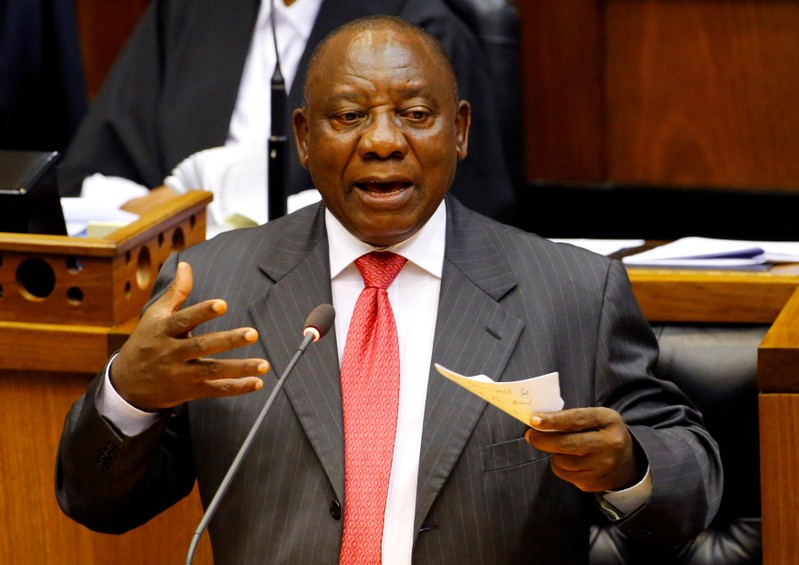
FILE PHOTO: President Cyril Ramaphosa addresses MPs in parliament in Cape Town, South Africa, February 15, 2018. REUTERS/Mike Hutchings/File Photo
September 21, 2018
By Olivia Kumwenda-Mtambo and Nomvelo Chalumbira
PRETORIA (Reuters) – South Africa’s president announced a multi-billion-dollar stimulus program on Friday, earmarking funds for job creation and infrastructure development as he seeks to make good on a pledge to revive the country’s ailing economy.
Speaking a day after the central bank disappointed some in his ruling African National Congress (ANC) party by not cutting interest rates, Cyril Ramaphosa said the government needed to put the funds at its disposal to better use.
“We have to resort to reprioritizing our budget,” Ramaphosa told reporters in Pretoria, adding that there was no room to increase spending or borrowing.
He said 50 billion rand ($3.5 billion) of “reprioritized expenditure and new project-level funding” would be used to boost economic growth and create jobs, and the government would also launch a 400 billion rand “medium-term” infrastructure fund.
“The central element of the economic stimulus and recovery plan is the reprioritization of spending toward activities that have the greatest economic effect,” he said.
When he took over in February from Jacob Zuma, whose term of office was plagued by scandal, Ramaphosa staked his reputation on economic revival and he received a warm welcome from investors in part due to his strong ties to the business community.
But having stagnated for a decade, Africa’s most industrialized economy slipped further in the second quarter by entering recession for the first time since 2009, while the rand has weakened.
The local currency briefly extended gains after Ramaphosa’s speech before slipping back to trade 0.31 percent firmer against the dollar.
SLOW GROWTH, HIGH UNEMPLOYMENT
Ramaphosa said the infrastructure fund would attract finances from development institutions and banks, private lenders and private sector and ordinary investors.
Finance Minister Nhlanhla Nene told the same event that the 50 billion rand fund would come from under-performing government programs. He gave no detail and it was also not clear how much of the money would be new funding and how much would be shifted from other projects.
South Africa needs faster economic growth to reduce its 27 percent unemployment rate and alleviate poverty and inequality, which are stoking instability ahead of national elections next year.
But the central bank on Thursday also cut its gross domestic product forecast for 2018 and said there was little leeway in monetary policy to boost the economy beyond the new growth figure while the outlook for inflation had deteriorated.
Land and mining ownership reforms set in motion by Ramaphosa have also unnerved investors, and after an initial rally following his election as ANC leader in December and state president in February, business confidence has wavered.
Ramaphosa said the country’s economy would be put on a firmer footing by the measures he announced on Friday.
“Our economic challenges are huge and our difficulties are severe and in the end will take extraordinary effort and they will also take some time,” he said. “For several years our economy has not grown at the space we needed to create enough jobs.”
(Additional reporting by Mfuneko Toyana and Joe Brock in Johannesburg; Writing by James Macharia; editing by John Stonestreet)

